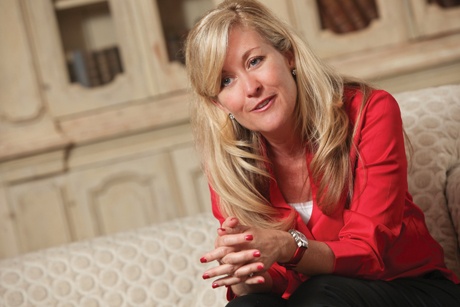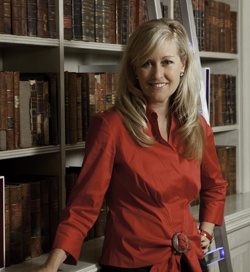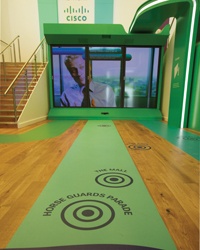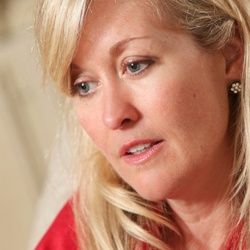Cisco's £8bn geek
How to build sales and influence people
Blair Christie’s all-American optimism is getting her through the highs and lows at global networking company Cisco as she vows to make every cent count in her latest role as chief marketing officer.

Blair Christie, chief marketing officer at networking giant Cisco, cheerfully navigates her way through the history of the company, dropping in tech-laden nouns as if they are part of everyday conversation.
While the mere mention of a router or switch may make many marketers twitchy, one can’t imagine Christie ever having shied away from such technology geekery, which is core to Cisco’s business.
After 18 months at the helm of the marketing and communications team at one of the biggest brands in the world - worth $13.3bn (£8.4bn) according to Millward Brown’s BrandZ Top 100 - Christie is comfortable talking through the challenges and opportunities that this role and the company face.
And the challenges are many. Like the majority of global businesses, Cisco has been feeling the effects of the protracted economic downturn. Under the leadership of John Chambers, Cisco is in full austerity drive, with plans to save $1bn (£630m) a year. A job cut announcement in June will see 1,300 people go - although the company would not confirm if the marketing department will be affected. This announcement comes off the back of the 10,000 posts already cut from the company last year.
But while Christie acknowledges that things have been tough, she maintains a positive and persuasive disposition, part of her all-American optimism.
“It has certainly been an interesting 18 months,” she says with a smile over breakfast at the central London hotel where Cisco executives and customers were camped out during the Olympics, of which the company is a tier two sponsor. “Cisco is very correlated to the GDP. It’s the kind of business that we do.”
Plummeting stock
Her 13 years at the firm have seen her experience the very best times and then, quite quickly, dealing with the bad times. At the company’s height in 2000, Cisco was the most valuable in the world according to the Nasdaq exchange but within a year its stock price plummeted, it issued a profits warning and cut 20 per cent of its workforce.
She says: “I’ve been at Cisco for a long time. I’ve seen the highs and lows. When I joined Cisco, I was working in the investor relations team. It was an $80 stock. It was wonderful, but I watched it fall to $9 as the market shifted.”
But Christie stayed through the low to see the company come out the other side. “The economy changed but I saw Cisco come out stronger. Because we are so correlated to the GDP, we tend to come out of the blips very strongly. We always gain market share and we usually have the highest performing stock among our peers at that time.
“I’ve seen it all before, but I’m not sure there’s anything that quite compares to now. It always feels a little worse, or a little global. You have to take these moments as an opportunity.”
She adds that the marketing department’s job is to position the opportunity differently. “There’s still opportunity. It may be more muted because of the economic environment but businesses still have to grow and we can help them to do that.”
To demonstrate what the company can offer other businesses, Cisco signed up as a tier two sponsor of London 2012, and worked with broadcaster NBC to provide its online network for coverage of the Games (see The Olympics: leaving a legacy, above).

But while the business recently posted better than expected fourth quarter results - turnover of $11.7bn (£7.4bn), up 4 per cent on the previous year - analysts have pointed out that this has been achieved by tightening spending and slashing staff numbers rather than generating revenue.
Some have described the company as boring. In 2008 an ABI Research poll deemed Cisco to be ‘boring but trustworthy’. And it still lingers. A recent article by analyst Richard Saintvilus described both Microsoft and Cisco as boring and said that Wall Street had lost interest in both companies in favour of faster growing businesses such as Apple and Google.
Perhaps the newly appointed branding and advertising agency Goodby, Silverstein and Partners will help to inject some va va voom into the company.
But whatever views analysts and business journalists spout, Christie is adamant that being close to the customer will maintain profits and secure the long term success that many are cynical about.
Part of being close to clients is about having the right team to understand them and act upon their needs. And this is something that Christie was all too aware of when she took the job.
“When I took on the role, we brought all of the marketing teams into one group - my group - before we consolidated in the regions. We restructured to drive more integration across the business,” she claims.
With around 1,300 marketers in her team, Christie says she runs a “lean machine” and every marketing penny spent has to count. “We look at expense to bookings,” she adds, referring to the return on investment she must create.
But like many technology companies, Cisco has to balance what customers need now, developing products that will be useful in future.
Christie argues that knowing and understanding its customers now helps them to anticipate their future needs. “We worked with one retail bank to help build video so that people could go into a branch and access a remote expert if there wasn’t a banking specialist available. We wouldn’t have been able to do that if we didn’t know the issues but it isn’t something they asked for.”
Data is at the heart of understanding where Cisco needs to invest in marketing but this is something that she’s “very comfortable with”. (See Q&A, below.)
With a global marketing role, three children aged 10 and under, as well as a regular speaker on the conference circuit, plus mentoring the next generation of leaders, how does she fit it all in?
“You’d be amazed at what capacity you have if you’re interested. I give advice all the time. People come to me and say: ‘I don’t know what I want to do with my career, I want to take this job to get to this job,’ but if you’re not passionate, it won’t be.”
With that piece of positive advice, Christie is off to enthusiastically promote routers and switches to the world.
Possible pull quotes
“There’s still opportunity. It may be more muted because of the economic environment, but businesses still have to grow and we can help them to do that.”
“We tend to come out of the blips very strongly. We always gain market share, and we usually have the highest performing stock among our peers at that time”
The Olympics: Leaving a legacy
The giant green glow of the Cisco logo that featured in the skyline around the Olympic Park may not have meant very much to the thousands of visitors streaming in to watch the finest athletes on earth compete for a medal, but the B2B giant was certainly intent on making a very big impression. It entertained more than 11,000 customers at Cisco House, situated on top of Westfield Stratford City shopping centre in East London.
But the technology giant didn’t simply fork out for a gargantuan corporate jolly. Open for five months from April this year until the end of the Games, it has essentially been an interactive case study of what the company could offer to its customers, bringing to life its sponsorship of London 2012.
The technology company has put on a great show in order to do some big business deals, says Christie. “While it’s great for branding and awareness, we’re actually driving demands and have hard targets. We want to make sure we have follow-up calls with our customers to see if our showcase sparks a new or different conversation,” she says.
Providing the network IP to the broadcaster NBC for its Games coverage has demonstrated the scale at which the company is able to operate, claims Christie. “NBC says London 2012 is 10 times more complex than even four years ago in Beijing because of mobility and video. The Games helps to sell to other customers because they can relate to the kind of solutions that we brought to the table for this Olympics.”

Cisco House
But the legacy aims are not just about signing new contracts. Part of the investment in London 2012 was to show “commitment to the region because we’re going to be here for a long time”, she adds.
Speaking to Marketing Week earlier this year, Cisco marketing director for UK and Ireland 2012 Ian Symes said the Olympics is the “starting gun” for a five-year strategy to improve Britain’s network infrastructure and improve the skills of its 4,500 employees here.
In 2011 it pledged a $500m (£315m) investment goal that prime minister David Cameron “welcomed”. To embed itself into the community, it launched the British Innovation Gateway initiative to help start-ups work with bigger companies to aid growth and investment.
The company also developed Olympic-related workbooks and content to help improve maths and science skills at more than 4,500 British schools.
Christie believes there are comparisons that can be found in the running of London 2012 and Cisco. She explains: “The Olympics is about the whole experience, not just about who is there and being live at the Games. It’s about executing efficiently at the lowest cost because the Games has the same imperatives that a chief executive has.”
She acknowledges that in the past the Olympics and Cisco would have seemed like an unlikely partnership. “Perhaps 20 years ago there might not have been the same opportunity for Cisco or it might not have made sense to be as involved, but today it’s exactly what enterprises will be going for.
“But for us [there is a synergy] because these issues are exactly what enterprises are going through and we can provide solutions. It’s becoming more of a brand that people will understand” she believes.
Ultimately, though, being able to use the Olympics as a business case study is what the technology company hopes will win it more contracts and leave the company in a gold medal position.
But the work doesn’t stop there. Even before sprinter Usain Bolt was out of the starting blocks at London 2012, Cisco turned its attention to Brazil. In April it announced an $R1 billion (£310m) investment over the next four years, showing the might of the company and the clear strategy to ride the waves of sporting success as Rio prepares for the World Cup in 2014 and the Olympics in 2016.
Role models
Blair Christie, chief marketing officer at Cisco, doesn’t have to look very hard to find inspirational figures among her 1,300-strong marketing and communications team. Her colleague Mary Bradburne now is executive communications manager but in 1984, she probably wasn’t thinking about working for a global technology company.
That year, under her maiden name Mary Wayte, she donned a pair of goggles as part of the US swimming team. She won two gold medals in the Los Angeles Games in the 200 metre freestyle event and for swimming in the preliminary 4 x 100 metre freestyle relay team.
While she will be forever celebrated at her former education establishments as a role model used to motivate current students, her achievements haven’t gone unnoticed at Cisco. “I have an Olympic gold medallist swimmer on my team,” boasts Christie.
Blair mentors employees at Cisco to “try to pass it on” although she readily acknowledges that she can learn from mentors and be inspired by the likes of Bradburne.
The strong female cohort at Cisco demonstrates that there are no gender barriers to succeeding at the technology company - an area often described as a man’s world - or making it to the board of a NASDAQ-traded company. Christie has achieved all of this while having a one-year-old baby and two other children under the age of 10.

Christie regularly speaks about being a working mother and advises others who want to take the same path. “There aren’t the same sort of barriers that our mothers had, but there are choices to be made. It’s about blending your work and your personal life because you can never get a balance,” she says. This attitude won her Workingmother.com’s ‘Working Mother of the Year’ title in 2009.
But she says that it is the culture and the technology available at Cisco that enables women to succeed there. “I feel very fortunate because Cisco is open-minded as a company. With the technology that we have [such as video conferencing], you can make choices because usually it’s about where you work, when you work, how often you work. Flexible working is not just for mothers, it also applies to any working parents, or people that may have an elderly parent. There’s life outside work.”
Research points to reasons why more companies need to have a similar attitude to Cisco. A study around collective intelligence published in Science magazine found that performance was improved when groups included women and this year’s Millward Brown’s BrandZ research highlights that companies with women on the board outperform male-only boards. Brand values rose by an average of 66 per cent compared to just 6 per cent for those companies that have all male boardrooms, according to the study.
Like many technology companies, women are able to rise to the top in the usually closely guarded all-male high ranks. While many have criticised these impenetrable men’s clubs, which are usually about who you know rather than what you do, Christie says, in essence, rising to the top is still about networking to build your profile. “It is key,” she states.
But perhaps because technology companies are more youthful (Cisco was founded in 1984), the heritage of male domination isn’t so steeped in the company’s culture.
This certainly seems to be the case when looking outside Cisco, especially in the United States, Christie points out. “The chief executive of Xerox is a woman, the head of IBM is a woman, the chief executive of HP is a woman, and the new chief executive of Yahoo! is a woman.
She says of Marissa Mayer, the new chief executive at Yahoo! who has said she will take just two weeks of maternity leave when she has her baby this month: “She is going to set some records, that’s for sure.”
She adds: “You can’t be what you can’t see. So as women start to see more role models, they will see more opportunities.”
Christie believes companies should take a more active role in recruiting people who need to work flexibly.
“When Sheryl Sandberg, the chief operating officer of Facebook talked about leaving at 5.30pm there was a whole bunch of dialogue around this. People said: ‘That’s great for her, but what about the rest of us?’ There are opportunities for companies to make sure this is possible.
“Maybe it’s about creating dinner hours or more policies around flexible work. Companies are going to have to go where the best talent is and quite frankly some of the most talented people out there are women.”
Q&A
Marketing Week (MW): Where are you focusing your marketing efforts?
Blair Christie (BC): We’re putting more investment into our marketing globally. In the past we haven’t spent as much or done as much media buying outside a few countries. We’ve expanded our marketing in emerging markets such as Brazil and China, to get more of a presence there, as well as in Germany and the UK.
How does the marketing and communications team help to drive the business forward, especially in times of economic crisis?
We create a lot of new business - around 80 per cent is new every quarter. That’s a significant mountain to climb when you consider the economic climate out there, but if we listen to our customers and what they’re going through, regardless of the environment, there’s a huge opportunity in marketing and communications to drive our messaging in terms of how Cisco can partner with other businesses.
MW: How do you decide how to allocate marketing budget, especially at a time when every penny counts?
BC: What fascinates me about marketing these days is how much data is available. I can look at the optimum spend by country and I can really understand what our return is.
MW: Do you ever put aside the science part of marketing and go with instinct?
BC: Don’t you believe that you make a better decision if your foundation is based upon data? Once I look at the data then I have lots of headroom to make those creative decisions. For me, that’s a very comfortable way to work.
MW: There has been a drop in the share price of several technology companies, including Cisco. How difficult is it for a technology company to continue to thrive?
BC: There are no sure bets in technology. That’s actually a good thing for us because otherwise there would be four companies that would dominate all the time, like in retail. In Cisco’s case, we have all the right assets, so it comes down to leadership and strategy.
MW: Is it difficult to communicate to a layperson what Cisco actually does?
BC: We’re always going to have that B2B hurdle to get over for the average individual. Some of the solutions and the services that we offer get to the worker or the end user.
Prior to 2006, outside the IT department and the chief information officer, people didn’t know what Cisco was. But that year we introduced video conferencing, which put our brand in the C-Suite. Chief executives bought our products in an instant because it gave them the ability to save on travel [by having virtual meetings via video conferencing].
That coincided with the Human Network [advertising campaign] which made Cisco more of a household name.
MW: How do you think Cisco is perceived?
BC: Clearly there’s familiarity, but we’re not quite where I’d like us to be because there’s a lot of people who don’t understand what a switcher or a router can do. I’m pleased with our progress and my predecessor Susan [Bostrom, who left the company after 14 years in 2011 to pursue other business interests] left the brand in a place where we have a very strong brand familiarity and favourability but we’re not a consumer brand and nor should we be.
MW: Where do you see the growth opportunity?
BC: Only 2 billion of the 7 billion people in the world are actually on the internet, so we think there’s a lot of opportunity. There’s an opportunity to take video to another level and into the consumer space too.









